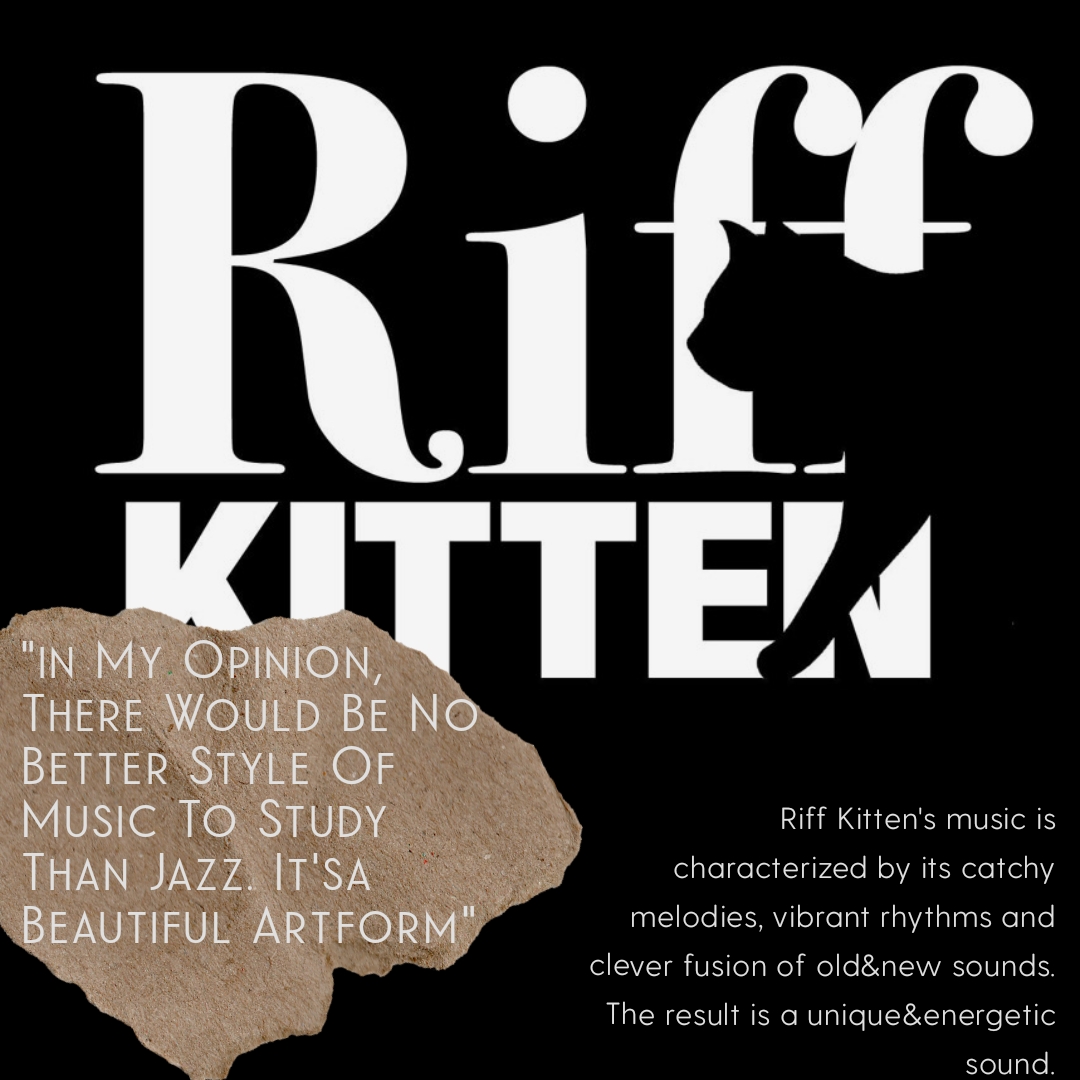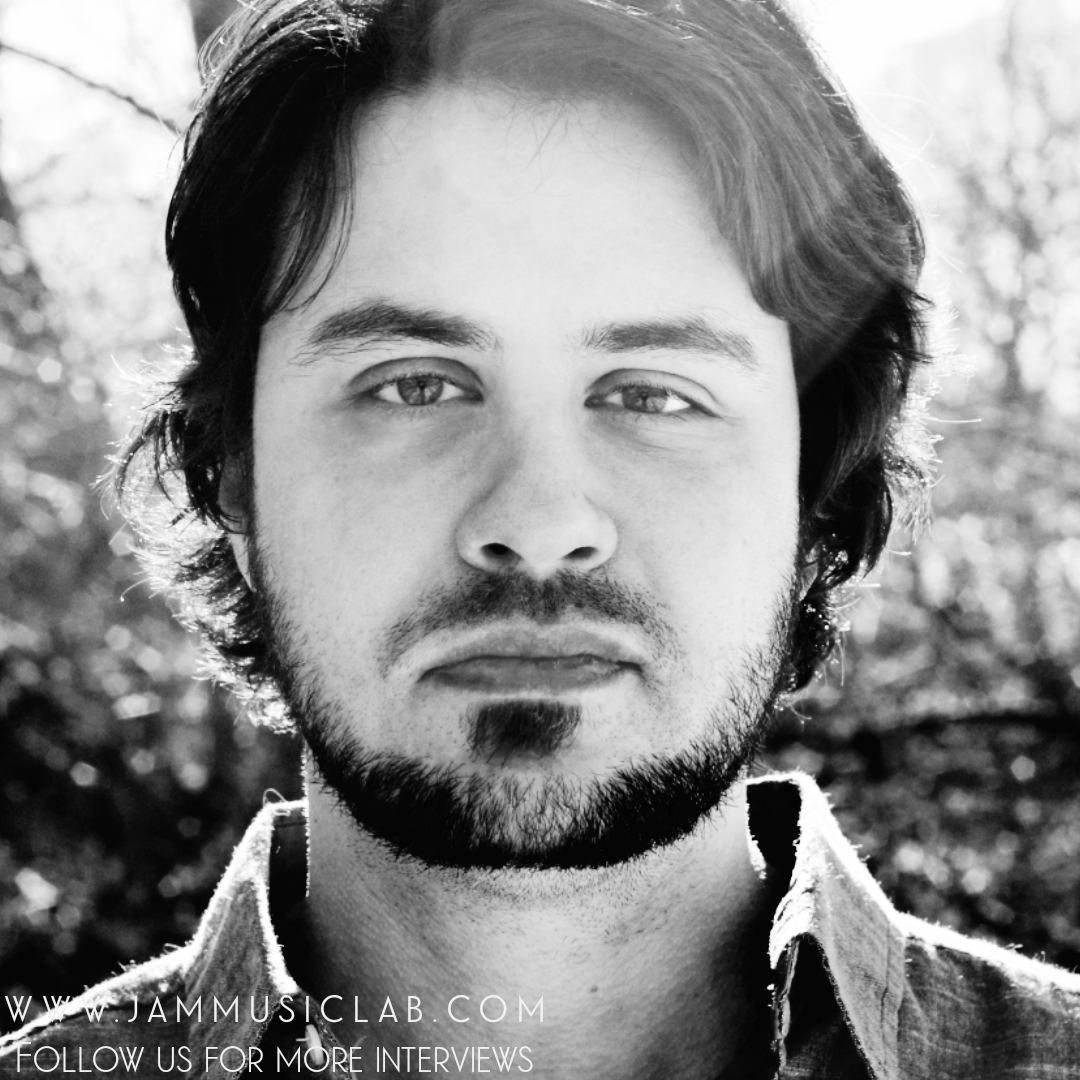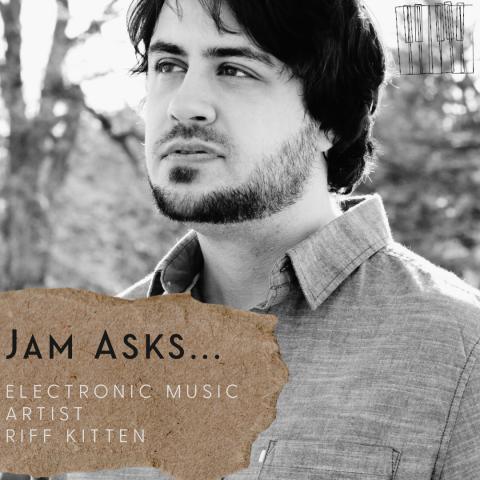JAM asks...Riff Kitten
JAM asks..."Riff Kitten". Andrew Reilly, a.k.a. 'Riff Kitten,' is a prolific music producer based in Minneapolis. Classically trained in composition at the University of Minnesota, he fell in love with electronic music shortly after graduation and came over to the dark side! Featuring an eclectic variety of influences including those from his film and classical music background. He is known for creating a variety of music within the electro-swing and electronic dance music (EDM) genres. The tracks often feature a mix of vintage swing or jazz elements combined with modern electronic beats and production techniques. The result is a unique and energetic sound that appeals to fans of both classic and contemporary music styles.
Riff Kitten's music is characterized by its catchy melodies, vibrant rhythms, and the clever fusion of old and new sounds. This blending of genres makes their music suitable for dancing, casual listening, and various multimedia projects. If you are interested in exploring Riff Kitten's work, you can find the music on platforms like Spotify, Bandcamp, and YouTube. Riff often release singles, EPs, and albums, so there is likely a diverse catalog to explore.
Interview:
1. The best moment with the audience so far? I've had many great moments with my audience, it's hard to pick just one! It's a great feeling when my music inspires the creativity and talent of others. One of my listeners created a written short story that was based upon one of my tracks. I've also had many amazing dancers record choreographed videos to my music. My favorite place to interact with people is on my YouTube channel. Sometimes, I'll hear from listeners who say that my music gets them through a bad day. That means the world to me. When I started Riff Kitten, I was mainly hoping that I'd findan audience and gain streams, but to have a positive impact on someone's day honestly feels as good as getting 'high numbers' and decent play counts.
2. What does your studio look like? studio looks quite minimal and basic, which is okay with me because I like having a nice clean and streamlined workspace. In terms of hardware, I just have the basics - a pair of good mixing monitors, Scarlett audio interface, and Novation Impulse MIDI controller keyboard. On occasion, I'll record some basic stuff on guitar to give my productions a bit more of a 'human' touch. Or, I'll hire a session instrumentalist on Fiverr to give me track a more organic feel. Most of the sounds I generate are from using various software plugins and virtual instrument libraries (in addition to samples that I find and tweak to fit my songs). One day, when finances and space allow, I would like to acquire more hardware and expand my studio. That said, for anyone just getting started with music production, you really only need to make a minimal investment to make great music - it's more about how you use the tools you have.
5. Do you have little rituals before or after a performance? Or even when a song/album/artwork is finished? Throughout the day, the perfectionist in me is constantly thinking about my tracks and how I can modify or improve them, even when I'm away from my studio. It can be exhausting! So when I finally finish up a track or album, I'll always celebrate - go to a nice restaurant, buy a deluxe coffee drink, binge-watch an addictive show, etc. You've gotta reward yourself in these moments and do something different - take a mental vacation and enjoy the non-musical pleasures of life. That way, music stays fun and you'll come back to it refreshed.
6. How important is music for you in everyday life and as a musician? Very important, maybe even too important (but it is what it is!) I have to structure my time carefully so that I actually do other important things, otherwise I'd be listening to it and writing it non-stop!
7. Jazz artists without whose influence parts of your music would not exist? If you have any :) As a creator of Electro Swing, I have to give Scott Joplin a shout-out. I find his ragtime music very inspiring and fun to listen to, but having studied his compositions in college, I got to see his true genius. I also love the incredibly creative compositions of Duke Ellington. 
8. What worked well at the beginning of your career? What could have been better? The hardest thing in the beginning was getting rejections from labels / curators / channels. I couldn't help but feel like my music would never 'measure up.' With persistance and dedication, though, I started to find my voice and write the music that I wanted to write, not what I thought I needed to sound like. I put a lot of pressure on myself to be 'as good as ___ artist,' which is a flawed way of thinking, because it's more important to be authentic and maximize the skills you already possess (you can always learn what you don't know as you go). Once I started getting my more unconventional music out there, the response has been good and it's steadily growing each day! That said, don't completely ignore the defining characteristics of your chosen genre - you can find unique and creative ways to implement those characteristics in your own way. It's important because there are certain expectations in certain genres that listeners most likely need to hear.
9. What do you want your musical/artistic legacy to be? I want my music to be remembered for having made a positive impact on the world. It's my greatest hope that it makes as many people happy as it possibly can. I also want to be appreciated/recognized as someone who wasn't afraid to do something musically different.
11. Our students study jazz and popular music at JAM. How important do you think jazz is as a basis for practicing other musical styles? In my opinion, there would be no better style of music to study than Jazz. Harmonically, it teaches you almost everything you need to know pertaining to Popular music styles. It's colorful, rhythmically engaging with syncopated and swung metric patterns (which can help you understand how to get your audience hooked and grooving), with a huge range in mood and tone. It's a beautiful artform.
13. If you were to teach young music students, what would be the one elementary message to them and which subject would you choose? Remember to enjoy yourself. While practicing and learning takes work, it's meant to be enjoyed. I start many, many composition projects but only finish a handful of them. It's because I (and people close to me) can eventually hear the difference between something forced and something inspired. On occasion, I become inspired by something that started out forced, but usually it's because I take enough breaks to come back to it fresh. So, if you're feeling burned out - take a break and do something else. You want to keep your love for music fresh, with almost a beginner's mindset and genuine enthusiasm, if possible.
14. You are considered an important representative of electro swing, among other things. Is there another musical era that you would have liked to live in or that particularly inspires you? Definitely! The 60s and 70s have always appealed to me culturally. I'm really sort of a peaceful hippie at heart just trying my best to navigate a complex, stressful world. I think if I were born then, I'd be a B3 organ player / composer playing in a Progressive Rock band and having a good time.
15. How important do you think the subjects of self-management, audition training and dealing with stage fright are at music schools and universities? Very important - when I started music school, I had never played in an ensemble and basically just wanted to write songs, having been acceped into the composition program based on the CD I created for the composition faculty. Then, I learned that I would be required to become 'much better' at piano and join an ensemble. I was terrified of my audition, though I got through it all okay (well, okay enough). My lack of experience created a persistent performance anxiety, though. Had I had the mental tools to approach auditions, recitals, etc. in a healthy way, I think I would have learned to enjoy these things more. The resources need to be available, because it can be very stressful and discouraging when you have an overactive mind with little idea how to calm it down up on the stage. It can be done, but the only reason I know it can be done is because I read a bunch of books on meditation in my 20s, not because anyone taught or discussed stage fright coping strategies with me.
16. Do you think there should also be more interdisciplinary subjects at music schools and universities? In other words, cooperation with art universities, drama schools, museums, ... Absolutely. I had the opportunity to collaborate with my school's theatre department - I ended up composing for three plays, where I learned just as much about music as I did through my program's 'normal' curriculum.
17. Preparation for the music business at music schools and universities (signing contracts, looking for management, negotiating fees, artistic CVs and self-employment, etc.), in your opinion useful or very useful? Very, very, very useful. I never had the opportunity to learn about music business in my conservative, classical music program. It really is that important, because as musicians, we do all this work to become good at making music, while ignoring the knowledge that would help us when that first deal comes our way! When that happens, you want to be prepared.
 18. How does it feel to be on stage? How does it feel just before you go on stage? Well, for one, I'm sweating bullets both before and while on stage. Back when I performed more, it was a mental struggle for me every time. The way I learned to deal with it was to first accept that stage fright is in me. Panicking, running, and suppressing anxiety doesn't work. You have to surrender to the fact that you're nervous as hell, then replace negative thoughts with positive affirmations, and eventually the brain slows down and eases into the situation. This technique can also help any kind of anxiety. Don't panic, run, or give into the fear, because it ispossible to work through it!
18. How does it feel to be on stage? How does it feel just before you go on stage? Well, for one, I'm sweating bullets both before and while on stage. Back when I performed more, it was a mental struggle for me every time. The way I learned to deal with it was to first accept that stage fright is in me. Panicking, running, and suppressing anxiety doesn't work. You have to surrender to the fact that you're nervous as hell, then replace negative thoughts with positive affirmations, and eventually the brain slows down and eases into the situation. This technique can also help any kind of anxiety. Don't panic, run, or give into the fear, because it ispossible to work through it!
19. Is there religion in your music? There is - just a little bit. I'd say more spirituality than religion, as I try to be conscious and respectful of the wide-ranging personal beliefs of others. One song called 'Where's the Love' on my first album has a Gospel / Soul influence that was inspired by the Psalms. It was a musical expression of my feelings of disconnection with God. Other times, I'll try to compose my lyrics to have dual 'layers,' simple on the surface, but with 'deeper' meanings for those who feel presently inclined to explore spirituality.
20. Is there religion in you? Over the years, I've fluctuated in my spiritual beliefs. As an adolescent, I was agnostic, searching for a source of hope in the universe. In my early twenties, I started practicing Zen meditation, which led to insight that gently opened many spiritual doors, including my awareness of a divine source of love that went beyond my limited human understanding. In that presence, though often fleeting, I felt whole.
Photocredits: Sarah Soderlund @capturingtimephotos










